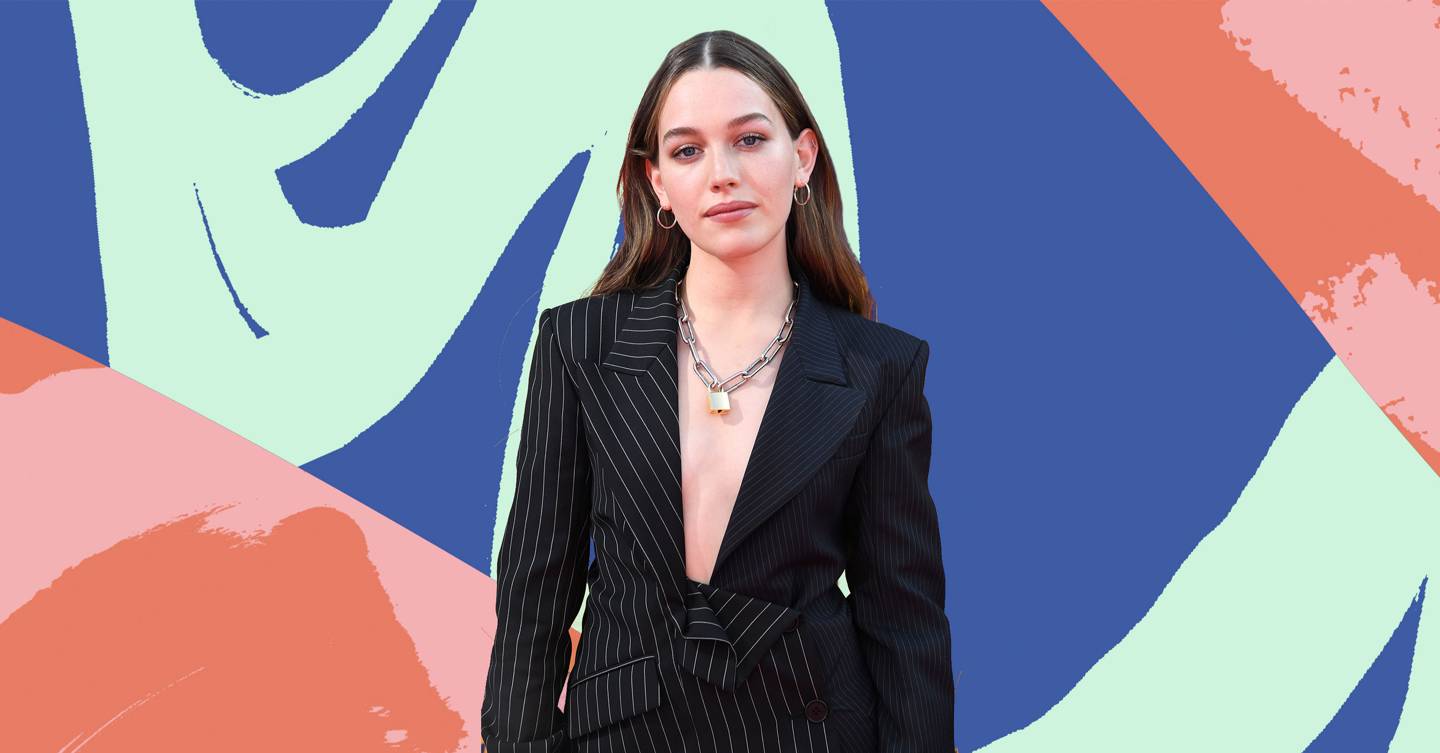WARNING: This interview includes spoilers for The Haunting of Bly Manor
Raise your hands if Netflix’s latest horror TV show, The Haunting of Bly Manor has given you nightmares? Well, I certainly have been covering mirrors and sleeping with the bedside lamp on after watching the second season of the Haunting anthology series and that is thanks to Victoria Pedretti’s Dani.
WATCH: Victoria opens up about having ADD & shares a powerful pro-choice video poem, This Is Not a Love Letter (Warning contains spoilers)
The new American nanny on the scene, Dani, has to battle her anxiety, guilt, insecurity and sexuality in the traumatic environment of a haunted 1980s English country house where nothing is what it seems. Throw in mindblowing plot twists and Victoria’s incredibly impactful and anxiety-inducing performance and you have the unsettling material nightmares are made of. Mary Poppins clearly had a much easier time being a governess.
But what else would you expect from the 25-year-old actress who is versed in fierce AF roles since bursting onto the streaming scene as Nell Crain in Haunting’s first season The Haunting of Hill before going toe-to-toe with the creepiest boyfriend on TV, Penn Badgley’s Joe in You’s second season, playing the unnervingly violent Love Quinn.
In the space of her three years on screen, Victoria has shown she will never shy away from a challenge but as I find out when I Zoom into her Los Angeles home – as Victoria is surrounded by moving boxes – her greatest challenge came when she wasdiagnosed with ADD at the age of six.
WATCH: This Is Not a Love Letter a powerful must-watch about one woman’s abortion
Here, as Victoria appears in the video poem, This Is Not a Love Letter – where one women recounts the story of her abortion for the first time to a circle of her friends – the actress opens up about how she never let her ADD diagnosis define her, the Haunting at Bly Manor plot twist that shook even her, and shares her powerful words on abortion and choice. We defy you not to be inspired by Victoria, this is a role model…
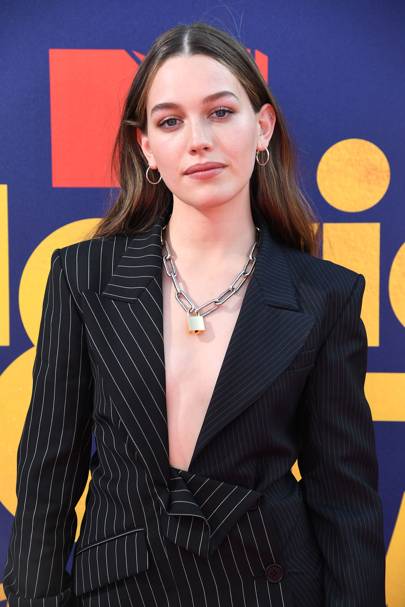
Getty Images
What was the plot twist in The Haunting of Bly Manor that shook you the most?
Probably Hannah being dead the whole time! That blew me away, when we were talking about it in the writer’s room, I was like, “What? She was dead the whole time?”
Dani is carrying around her own trauma in a traumatic environment. What was it about this character in particular that made her more difficult to play than others?
I think a lot of it was the physical aspect and the amount of information I was holding in my head at any given moment, because I hadn’t ever done anything quite this rigorous. I hadn’t worked quite as long hours, continuously. There was that and just the time in my life. I’m 25 and I’m now moving from having worked pretty consistently for about three years and I haven’t had much time to process – whatever that means – and adjust to that change. I feel like that had a lot to do with it.
Also, Dani is so big and she’s also very anxious. When I’m doing all of those anxiety attacks, I’m not having an anxiety attack, I assure you, but I’m shaking, I’m crying and that’s exhausting in a very specific way. You know how you feel after you have a big cry? But I’m doing that over and over again. I get to watch it and be like, “Yeah, okay. It’s worth it,” but at the time I think I had a harder time understanding that.
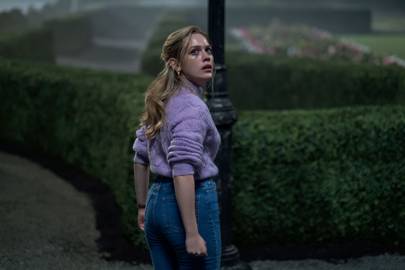
What’s so great about The Haunting of Bly Manor is whilst it’s thrilling, it really brings to the fore that everyone is carrying around their own trauma. That is such an important conversation for us to be having isn’t it?
Definitely – I think that so much of what the first and second season exposes is how we can’t make assumptions about people in their lives. We don’t know what’s going on and most of the time people have been traumatised it’s very relative. I hate the idea of comparing suffering. I hope it makes people a little bit more aware and sensitive to that.
It also encourages us to be more forgiving of ourselves, too right?
I think that there’s so much of like, “well, what is that in good? What are my expectations of myself? What do I want to be? But also, who the f**k am I?” I think that Dani is doing so much of that, trying to figure out who she is, what she wants and claiming herself. There’s a scene that was cut, where Roby who plays Edmund – he’s my fiancé – comes into the school Dani is working at after she’s missed a viewing of the place they might get married at and he goes, “You don’t have to do this. I could take care of you.” Her response is, “This is my purpose. I have a talent for listening, being of service to these children and that’s the most important thing to me. That is never going to change. That’s who I am.” I think that moment is so significant. I think so many people see her relationship with him and think, “she’s gay, so that’s why she couldn’t stay with him,” but it’s so much more beyond her sexuality. It’s about her whole person, her environment, and how that’s not where she was going to be able to flourish.
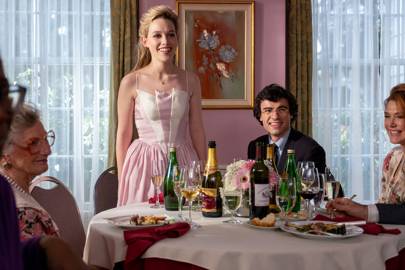
That plays into the idea that we still place labels on peoplewithout truly thinking and those labels can be so damaging. How has that idea of labelling played out in your own life?
I agree with you. I think that it’s very damaging. I think it’s something that creates a lot of division and can create isolation. Some people take so much pride, security and enjoy being a part of a label because it suggests a community. But it depends because some labels are choices and some labels aren’t. For instance, I have ADD, and that label did not suit me, I felt. I was six years old or seven years old and being told, “you might not ever be able to read and write well. You’re going to have a higher rate of incarceration, higher rate of drug use, higher rate of lots of medical problems. It’s going to be very hard for you to live a healthy lifestyle.” I just looked at that label and I was like, “no, that’s not me!”
I have ADD, severe ADDwhatever that means. It affects the way I live, the way I think, the way I process information or don’t process information. But it was so damaging to me at that age because it didn’t do anything for how I defined myself. It only allowed other people to make assumptions and feel like they had the answers to something far more complex than ADD. People with ADD are very different. I remember going to an ADD support group of being like, “I don’t like these people,” and why should I?” Those mental diagnoses, I feel like they often do so much more for the people treating you, than it does to the actual individual having an understanding and feeling empowered within their identity.
That leads me onto, This Is Not a Love Letter. I think it’s so important that someone like you is lending your voice and your message to the subject of abortion and choice. What really spoke to you about this project?
I mean, I agreed to be a part of it before I understood what it was. I agreed to be a part of it because my close friend told me that she’d written something, and that she wanted me to be there, and that a bunch of other women are going to be there. Some people I knew, some people I didn’t know. I went into the room and she read the poem to me for the first time. I had been in school with this woman for four years, and I didn’t know this story. It’s really powerful, isn’t it? Not only her sharing her experience, but the way that she articulates herself.
I agreed to do it because it was Isabel, because she’s one of the best people I know. Then afterwards I found out that I was very, very lucky to be asked to be a part of something extremely powerful and informative. I feel so strongly that this conversation around abortion is being held by a bunch of people who don’t know sh*t about what it is to have that experience. She’s an authority on that, and so she needs to be listened to.
The people who experience these things are the ones to be listened to. The only way people justify life at conception is through some Christian standard. It completely gets in the way of the separation between church and state. Yet you still see in this story that the morality taught through Christianity still made this woman question whether or not God loved her. We have our own morality; the government shouldn’t be defining that for us.
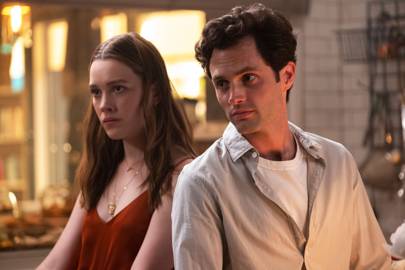
You’re asking such good questions. I even think about the ADD thing, the additional thing to add is if I had listened to people I wouldn’t be where I am. If I had thought of it as a deficit, I wouldn’t be here. I feel so strongly that I want to be a voice within that community because I even listened to an ADD podcast recently. The person was like, “if you’re not medicated, you can’t expect to function at the rate of other people.” I was like, “this is being upheld by the one ADD publication in the world – I think it’s so damaging.” The idea that people can make those kinds of decisions for others is really ridiculous. I don’t understand why people want to get into other people’s business so much.
It’s so incredible you have used being diagnosed with ADD as a form of empowerment and not treated it as something that should hold you back…
I don’t feel like I found it empowering until I’ve gotten to this point, until I’ve exited academia, found my way into having a career and making a life for myself. I think I always questioned that it would be the thing that just f**ked me up because people weren’t particularly accommodating or understanding about it. People tried to tell me about my own brain and my own mind, my entire life. I think that that’s really destructive, but now I can see it. I feel like I need to talk about it because I need other young people that are struggling in school, or struggling with their emotions and their feelings, to know that it’s f**king normal, that they’re not deficient or defective. I wish the educational system in this country catered to more people and that I had more teachers that had the tools to understand and help me.
That’s what is so powerful about This Is Not A Love Letter is that it hopefully teaches people about the experience of having an abortion…
I was so blown away by the work of Ariel and Isabel. There are f**king bad ass women out here who deserve so much recognition. This is made through CNT productions, which is a production company that focuses on the voices of women, especially marginalised women, to create our own work and to elevate those voices. I see how powerful it is, I can’t watch that video without crying. Maybe it’s because I know so many of those women and I love them so dearly and to think of any of us being expected to carry out a pregnancy that we did not want, one. Or two, to get an abortion and have anything come in the way of that choice just devastates me. I know that we have what it takes to protect these rights. What the f**k is worth free speech worth if you’re outside of fucking clinic, trying to shame women. I don’t know.
Raising women’s voices and making sure that these stories are being told is the most important thing we can do right now isn’t it?
Yeah. This poem is a part of a series, one of them is Black Girl Poem, which my friend Daryl wrote, which is also really beautiful. There’s cool animation with it. It’s on YouTube now. It’s really, really f**king good also. I just have such talented friends. I don’t know how I got so lucky to have such talented, kind, and generous people in my life. That’s really nuts.
What you said earlier about labels really hit me because I personally feel like with my own sexuality that label can be exhausting at times…
I agree completely – so often they serve other people. They give other people the option to be like, “Oh, now I know what you are.” That’s why I couldn’t claim ADD because I knew all of the associations with it. It’s still not a defining factor. I’m still not going to tell people that in a conversation. But I think it’s valuable to talk about it in interviews. I know it doesn’t define me. I think it’s so valuable to be able to look into yourself and not be like, “what’s wrong with me?” But just be like, “what is me?”
I’ve been watching, Euphoria and it does such a great job of showing how all of these labels don’t define us. It’s so great being an actor because I don’t play labels. I play people and that’s the goal. You can either uphold all these assumptions, labels and stereotypes, or you can do things that divert them. I think my show does a pretty good job of bending those things, making us question and just seeing things differently, I hope.
The Haunting of Bly Manor is streaming on Netflix now
